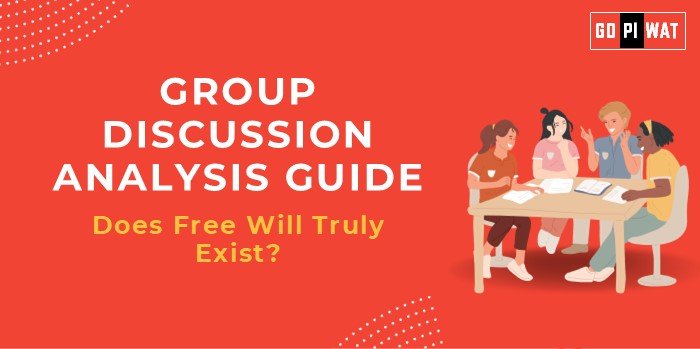📋 GD Analysis Guide: Does Free Will Truly Exist?
🌐 Introduction to “Does Free Will Truly Exist?”
Opening Context: “The debate on free will is one of the most enduring questions in philosophy, with profound implications for ethics, law, and psychology. It challenges our understanding of human agency and responsibility.”
Topic Background: Originating in classical philosophy with thinkers like Aristotle and later debated by Descartes, Kant, and modern neuroscientists, the concept of free will examines whether human actions are genuinely autonomous or determined by external and internal forces.
📊 Quick Facts and Key Statistics
- 🧠 Scientific Findings: Neuroscientific studies like Benjamin Libet’s experiments suggest decisions may be made by the brain before conscious awareness.
- 📊 Psychological Perspective: Surveys indicate 60% of people globally believe in free will, while 40% lean toward determinism.
- ⚖️ Ethical Implications: Many legal systems assume free will in assigning accountability for actions.
- ✝️ Religious Influence: Most major religions incorporate free will as a core tenet of moral responsibility.
🎯 Stakeholders and Their Roles
- 💭 Philosophers: Debate and refine the theoretical understanding of free will versus determinism.
- 🧪 Neuroscientists: Explore biological mechanisms to determine the extent of autonomy in human decision-making.
- ⚖️ Legal Systems: Rely on free will assumptions for judgments of culpability and intent.
- ✝️ Religious Leaders: Advocate free will as essential to moral choice and spiritual accountability.
🏆 Achievements and Challenges
✨ Achievements:
- 🌍 Ethical Frameworks: Free will underpins justice systems and moral philosophies worldwide.
- 🧠 Scientific Insights: Studies like those by Libet and Haynes advance our understanding of decision-making processes.
- 📚 Cultural Discourse: The topic remains central in literature, media, and philosophy.
⚠️ Challenges:
- 🔬 Determinism Evidence: Neuroscientific findings challenge traditional notions of free will.
- 🤔 Ethical Dilemmas: If free will doesn’t exist, notions of accountability may need reevaluation.
- 🌏 Global Comparisons: Western cultures tend to emphasize individual autonomy, while Eastern traditions often focus on determinism within larger systems.
Case Studies:
- ⚖️ Neuroscience and Law: The use of brain scans in courtrooms raises questions about culpability and predetermination.
🗣️ Structured Arguments for Discussion
✔️ Supporting Stance:
“Human beings exhibit autonomy in decision-making, distinguishing them from purely mechanical or deterministic systems.”
❌ Opposing Stance:
“Free will is an illusion; our choices are shaped by genetics, environment, and subconscious processes.”
⚖️ Balanced Perspective:
“Free will exists to some degree, but is heavily influenced by biological, social, and environmental factors.”
🧠 Effective Discussion Approaches
💡 Opening Approaches:
- 📜 Historical Insight: “The debate on free will dates back to Aristotle, yet modern science is reshaping its boundaries.”
- 📊 Statistical Evidence: “Studies reveal that brain activity predicts decisions seconds before conscious awareness.”
- ⚖️ Ethical Question: “Without free will, how do we justify moral and legal responsibility?”
🤔 Counter-Argument Handling:
- ✔️ Rebuttal: “Acknowledge that determinism has scientific support, but highlight the complex interplay of consciousness and subconscious influences in decision-making.”
- ✔️ Example: Addiction and habit formation provide real-world instances of both free will and determinism at work.
🔍 Strategic Analysis of Strengths and Weaknesses
- ✔️ Strengths: Ethical foundation, cultural importance, neuroscientific exploration.
- ❌ Weaknesses: Contradictory evidence, philosophical abstraction, legal implications.
- 🌟 Opportunities: Integration of interdisciplinary insights, rethinking justice and ethics.
- ⚠️ Threats: Misuse of determinism to justify unethical behavior.
📚 Connecting with B-School Applications
- 🌐 Real-World Applications:
- Apply free will in case studies on ethical decision-making, leadership, or behavioral economics.
- ❓ Sample Interview Questions:
- “How does free will influence leadership styles?”
- “Can deterministic theories be applied to predict consumer behavior?”
- 🎓 Insights for Students:
- Use this topic to explore human motivation, accountability, and ethical leadership.


